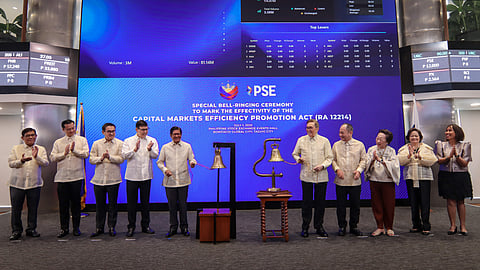
- NEWS
- the EDIT
- COMMENTARY
- BUSINESS
- LIFE
- SHOW
- ACTION
- GLOBAL GOALS
- SNAPS
- DYARYO TIRADA
- MORE

President Ferdinand Marcos Jr. on Monday rang the bell at the Philippine Stock Exchange (PSE) to mark significant progress in stock investment.
In May, Marcos signed Republic Act 12214 or the Capital Markets Efficiency Promotion Act (CMEPA) which aims to entice potential investors to make investments with low tax rate. The new measure took effect on 1 July.
“Before this law, investing in stocks meant paying a tax of 0.6 percent — six times higher than our neighbors in Singapore and Malaysia, and certainly the highest in ASEAN,” Marcos said. “Under CMEPA, that rate has been reduced to 0.1 percent.”
“For a first-time investor buying a ten-thousand-peso worth of stock, this means paying P10 in tax instead of P60. This will encourage more Filipinos to invest in our capital market,” he added.
Marcos noted that the new law also removed documentary stamp tax on mutual funds and unit investment trust funds which are widely used by young professionals and middle-class savers.
Tax reforms
Other tax reforms provided by the law include having a uniform final tax rate of 20 percent on interest income, incentive for companies that help employees save for retirement, and 50 percent tax deduction on actual contributions that are paid for by private employers that match or exceed workers’ contributions to their Personal Equity and Retirement Accounts.
The CMEPA also removed certain exemptions to enhance fairness in the Philippine tax system.
Government-Owned or Controlled Corporations are now generally subject to the same passive income taxes as other institutions.
In the next five years, CMEPA is projected to generate over P25 billion in net revenue which can help fund the construction of roads, bridges, hospitals, schools and other social safety net programs.
“But beyond revenue, CMEPA reinforces confidence. It shows that our financial system is becoming more equitable and structured for long-term stability,” Marcos said.
“So, let me be clear: The reform is not just for the well-off and for professionals, for the stock traders. It is for every Filipino who dreams of better financial security. It empowers the small business owner, the young professional, and the overseas Filipino worker to start investing their hard-earned money to build a better future,” the President added.
New era of trading
In addition to enhancing competitiveness in the ASEAN region and the global stage, Marcos said the new law would remove bureaucratic delays.
“To ensure the successful implementation of this reform, I direct the Securities and Exchange Commission to streamline its procedures, remove bureaucratic bottlenecks, [and] reduce transaction costs within its control. Undertake the necessary changes to fulfill your responsibilities in these changing times,” Marcos emphasized.
He also stressed that market integrity is a “shared responsibility” urging stakeholders to uphold transparency, fairness and good governance.
“By working together in good faith, we can build an industry that earns the market’s trust both here and abroad,” he said.
“As we ring the bell to open the market, we signal a new era of economic dynamism, investor confidence, and sustainable growth. Let every ring—from this morning and every trading day thereafter—echo our strength, our optimism, [and] our shared hope for a more prosperous future for all Filipinos,” said the President.
